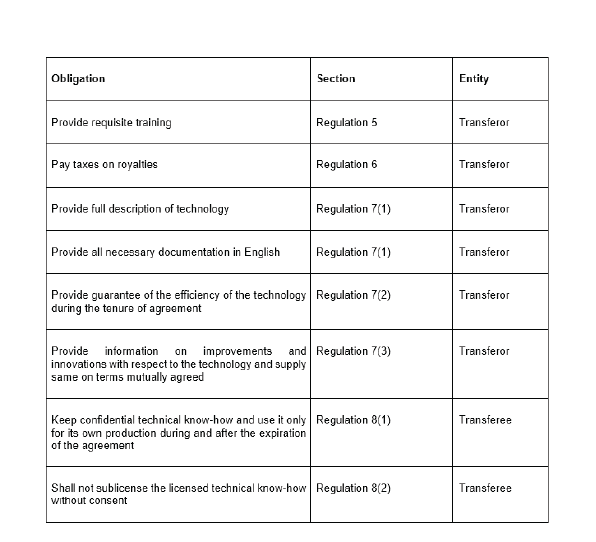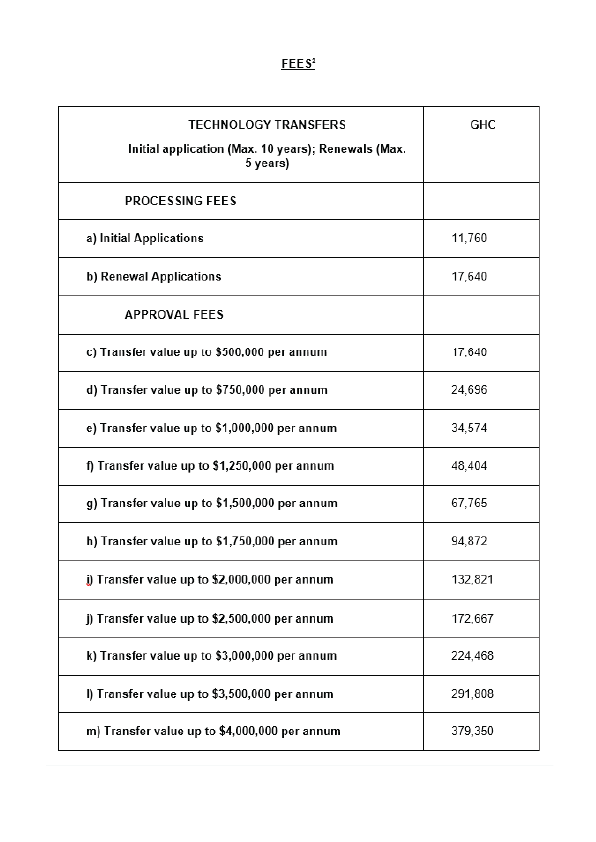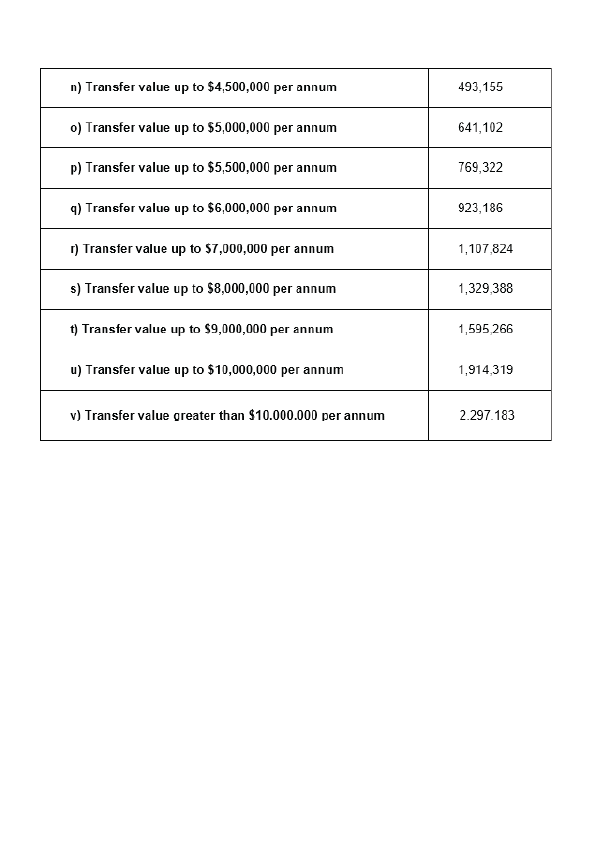
Technology transfer agreements (hereinafter called “TTA(s)”) are specific agreements that relate to the provisions of services especially from foreign entities (Transferor) to local entities(Transferee). It covers services such as technical assistance or know-how, industrial property services and management services
TTAs are governed and regulated by the Ghana Investment Promotion Centre (GIPC) Act,2013, Act 865 and the Technology Transfer Regulation,1992 L.I 1547.
The interpretation section of Act 865, section 47 defines a TTA to be an agreement which has a duration of not less than eighteen months[1] and further provides 4 categorizations under which a TTA may fall and they include:
a. the assignment, sale and licensing of all forms of industrial property, except trademarks, service marks and trade names when they are not part of transfer of technology;
b. the provision of technical expertise in the form of feasibility studies, plans, diagrams, models, instructions, guides, formulae, basic or detailed engineering designs, specifications and equipment for training, services involving technical advisory and managerial personnel and personnel training;
c. the provision of technological knowledge necessary for the installation, operation, and functioning of the plant and equipment, and turnkey projects; and d. the provision of technological knowledge necessary to acquire, install and use machinery, equipment, intermediate goods or raw materials that have been acquired by purchase, lease or other means;
Regulation 1 of LI 1547 and section 37 of Act 865 provides that all TTAs must be registered with the Ghana Investment Promotion Centre (GIPC). LI 1547 further requires complaints with its provisions and stipulates in regulation 2 that a breach of any of its provisions shall render a TTA unenforceable. LI 1547 makes specific mention of certain clauses that when found in a TTA would render the entire document inapplicable and unenforceable. It includes:
a. clauses which seeks to transfer technology that is freely and easily available in Ghana or those that limit the volume of production or the sale of the products produced in Ghana
b. clauses that impose Export Restrictions on the local entities’ products to particular geographical areas, except when exclusive rights have been granted by the transferor to third parties.
c. clauses that require the local entity to export exclusively through the transferor, obtain prior permission for export transactions, or pay additional royalties on export sales.
d. clauses that obligate the local entity to acquire inputs(such as tools, raw material or equipment) exclusively from the transferor or specified sources, except when the inputs are unique to the technology or not commercially available elsewhere.
e. Clauses that impose obligations on the local entity to employ personnel appointed by the transferor, unless justified by necessity, reasonable remuneration, and supported by proper agreements.
f. Clauses that obliges the local entity to transfer improvements, innovations, or patents resulting from the licensed technology back to the transferor, except under certain reciprocal conditions.
g. Clauses that require payment for patent and industrial property rights even after their expiration, termination, or invalidation.
h. Clauses that prohibit manufacturing, sale, or both of products based on the technology or prohibits the use of the technology know how after the agreement expires.
i. Clauses that prevent the local entity from challenging or assisting in determining the validity of industrial property rights claimed by the transferor in Ghana either administratively or by means of judicial proceedings.
j. clauses restricting the local entity’s research and development activities to improve or adapt the licensed technology, or limiting access to related improvements.
k. clauses that forbid the local entity from using complementary technologies, manufacturing different products, or manufacturing products similar to those covered by the agreement.
l. clauses requiring the transferor’s consent for modifications or imposing unnecessary design obligations on the Local entity, unless the technology is used for specific licensed products under a licence or trademark.
m. clauses that restrict the scope, volume of production, or resale prices of the products manufactured by the Local entity.
n. clauses obliging the Local entity to sell all its products to the transferor or designated entities at fixed prices, except in specific circumstances such as exclusive manufacturing for transformation or the transferor’s distribution capabilities.
The LI further points out some express obligations of both the transferor and transferee



Per section 40(h) of Act 865,a person commits an offence if that person contravenes a provision of the Act. Section 41 provides the penalties for one who commits the offences listed under section 40. Therefore, failure to register a TTA as proscribed by Act 865 and L.I 1547 attracts some penalties and these penalties include;
- A summary conviction to a fine of not less than five hundred(500) penalty units and not more than one thousand(1000) penalty units
- A detailed training schedule
- In the case of a continuing offence an additional fine of not less than twenty-five(25) penalty units and not more than fifty(50) penalty units in respect of each day that the offence continues.
- An additional suspension or cancellation of the registration of an enterprise
- order the payment or part-payment to the appropriate agency of fees, taxes, duties and other charges in respect of which benefits were granted to the enterprise
- Revocation of some or all of the incentives granted to the enterprise
- Advise the Bank of Ghana to suspend any remittance including transfer of capital, profits and dividends from or by that enterprise
- Any other action that the Board considers appropriate.
- Fill a TTA registration form[3], And include the following documents:
- Three original/certified true copies (by a Notary Public) of the agreement to be registered
- A detailed training schedule
- A yearly forecast of fees payable to the transferor per annum for the duration of the Agreement
- Certified true Copy (by the Registrar-General's Department or a Notary Public) of Industrial property registration(s) if applicable.
- Certified Audited Financial Statements for the five (5) most recent years of Transferee company
- Certified true copy (by the Registrar-General's Department) of Company Regulations
- Add a Cover letter addressed to the CEO of GIPC. You pay the applicable processing fees by banker's draft in the name of GIPC and then submit the draft to the finance division of GIPC.
- Submit the documents listed above together with a receipt showing proof of payments to GIPC.
- It is reviewed and referred back to ensure compliance with the statutory requirements. If there are any non compliance issues the yearly Forecast of fees payable to the transferor is analysed to determine the applicable approval fees. The approval fee is payable to GIPC either by banker's draft or direct bank transfer. Evidence of payment of approval fees must then be submitted to GIPC. The TTA is then registered and a Certificate is issued by GIPC
- An approval letter by GIPC is sent to Bank of Ghana, Ghana Revenue Authority and the client to complete the process.
It takes eight(8)- ten(10) weeks to review the application. In case of any discrepancies in the documents presented, it is returned, and a period of up to 2 months is allocated for changes to be effected. After the two month period lapses, a fresh application is started and this means paying another processing fee.
Based on this an estimated timeline for the completion of a registration is between 10-20 weeks.
[4] This may not be the case in real time.

